By Reid Nakamura (Published in Fall/Winner 2022 Issue of Center’s Vanguard Magazine)
Last November, the Los Angeles LGBT Center celebrated the opening of the 70,000-square-foot Ariadne Getty Foundation Senior Housing building—a triumphant accomplishment after years of delays caused by the COVID-19 pandemic. At last, the Center’s goal of creating an inter-generational housing complex for LGBT youth and seniors was fulfilled, resulting in the completion of the ambitious Anita May Rosenstein Campus.
The opening of the new building, which added 98 affordable housing units for seniors, was hailed by then-CEO Lorri L. Jean as “a powerful reflection of the Center’s mission to build a world where LGBT people thrive as healthy and complete members of society.” But behind the scenes, the difficulties of operating a senior housing center amid yet another COVID surge were just beginning.
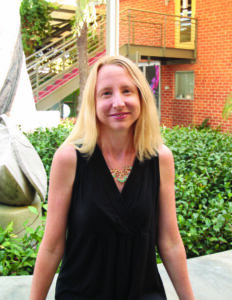
“It was extremely challenging,” said Kiera Pollock, the director of the Center’s Senior Services department, which marked its 25th year in 2022. “We had to stagger people moving in on different days and weeks so that they had less contact with each other on the way in. That was very hard to do.”
Beyond the logistical challenges of moving dozens of people into new apartments, the department also had a separate goal of giving residents opportunities to build relationships and community at a time when in-person gatherings were not an option. The Harry & Jeannette Weinberg Senior Center (located next door to the new housing complex) remained closed until April, when it was allowed to reopen at partial capacity per L.A. County guidelines for senior centers.
“We weathered [the storm]and now we’re trying to get folks back to creating community with one another in the building,” Pollock said. “Some of that’s happening organically, which is the way it should be. A resident might walk another resident’s dog or do other kinds of things for each other, which we’re happy about. But we feel like we need to give residents more chances to be engaged. That’s our goal for the next year more than anything.”
But after two-and-a-half years of virtual events and social isolation, the process of getting people back in person is not so straightforward. Beyond new health and safety precautions, there’s the added dimension of changed habits and lifestyles. For some who have been engaging virtually throughout the pandemic, returning to in-person events is yet another readjustment. Others may be eager to return to the Senior Center after a period of extended isolation.
“I think we all found different ways of coping during this pandemic, and now we’re trying to find our footing back in the world again,” Pollock said. “Even in my own personal life, I find myself re-evaluating what kinds of things I want to do.”
The goal, she said, is to find a way to accommodate everyone, because people need connection now more than ever.
“Our most popular programs for older adults are the relational activities. For the most part, they’re things like meals and parties and field trips, really being in community,” Pollock said. “A lot of the time, the reason people come here is to be with other LGBTQ people in person.”
A Decade in the Making
The challenges and logistics of the new building—pandemic aside—have been a dream long in the making for the Los Angeles LGBT Center. When then-CEO Lorri L. Jean brought on Alan Acosta as director of strategic initiatives in 2008, the expansion of Senior Services was one of the duo’s top priorities.
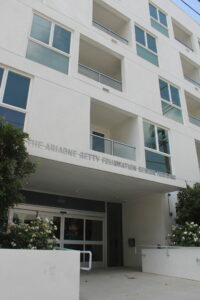 “They brought me on, but they weren’t really sure what my role was going to be,” Acosta recalled. “I was working on the new building project—which became the Anita May Rosenstein Campus—so it kind of made sense for me to take on senior services.”
“They brought me on, but they weren’t really sure what my role was going to be,” Acosta recalled. “I was working on the new building project—which became the Anita May Rosenstein Campus—so it kind of made sense for me to take on senior services.”
At the time, Senior Services was a smaller operation that was much more limited in scope and funding.
“We had two goals,” Acosta said. “The first was to find some funding, because we wanted to establish the Center as a full-service destination for LGBT seniors. Building housing was one of the key goals in the strategic plan.”
Acosta and Ariel Rosen, the department director at the time, found an answer to the funding question in the newly elected Obama administration. The Center won a $1 million grant from the U.S. Administration of Aging—the first-ever federal grant given to benefit LGBT seniors. Distributed over three years from 2009 to 2012, the grant funded a collection of services called the “LGBT Aging in Place Initiative.”
Among the initiative’s goals were creating more social and support resources for LGBT older adults, providing case management services, and supplying training for agencies and providers to ensure LGBT seniors are treated with dignity and respect. The Center’s program was one of 14 funded by the grant, all of which explored community alternatives to the institutionalization of older adults.
The program’s final report lays the foundation for what the Senior Services department would eventually become: a full-service operation that catered to the specific needs of its community. This included thousands of individual case management sessions, the creation of a new cultural competency training program offered to organizations state-wide, and dozens of new enrichment programs and mental health activities for seniors.
“We were the first organization to ever receive money from the federal government for LGBTQ seniors, so it was a big deal,” Acosta said. “That was the first significant funding we had for Senior Services, and it lasted three years. The problem was that at the end of the three years, they didn’t re-fund the program. So at that point, we had to dig back in and start looking for funding elsewhere.”
Acosta and the Senior Services team turned to the city and the county for funding, finding new sets of personalities and bureaucracy to navigate as they worked to keep programs funded and advance the new building project. “That kind of became the purpose of my life with Senior Services,” he said. “It was a 10-year effort that finally yielded last year.”
Diverse Programming for a Diverse Clientele
Today, every new Senior Services enrollee is greeted with a welcome email providing a full overview of the programs and services available to them.
“Do you need assistance with benefits, health/mental health, social support, or other needs?” The letter asks, with information about walk-in case management services, available in both English and Spanish. The question “Are you interested in learning more about affordable housing?” is followed by information about “Pathways to Housing” workshops. “Are you interested in entering or re-entering the workforce?” Employment coordinators help program participants develop job skills and identify potential employment opportunities.
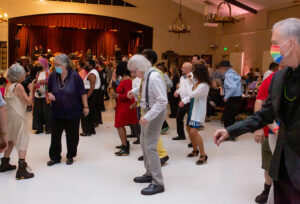 New participants are also informed that the Pride Pantry program provides food assistance, and the Senior Center hosts a monthly farmers’ market. The Culinary Arts Training program—staffed by Senior Center and Youth Center clients—provides grab-and-go lunches every weekday.
New participants are also informed that the Pride Pantry program provides food assistance, and the Senior Center hosts a monthly farmers’ market. The Culinary Arts Training program—staffed by Senior Center and Youth Center clients—provides grab-and-go lunches every weekday.
All of that doesn’t even begin to cover the social activities, support groups, creative workshops, exercise classes, and other events and programs that Senior Services runs at locations across the city. Four full-time activities coordinators help run as many as 75–100 activities a month.
“I wanted to see a really diverse slate of options because we’re serving folks from the age of 50 to 98,” Pollock said. “That’s a 50-year span, which means different sets of needs based on age, interests, language, and other factors.”
The unifying goal for the ambitious program is building community for LGBT seniors and meeting their specific needs. Senior Services is the only LGBT-specific senior program in L.A. County, and Pollock said some participants travel great distances to have those needs met.
“I don’t want someone in the community to read our newsletter and think that it’s the same as any other senior center. We really have an emphasis on programs exploring identity, sexual identity, and creating safe spaces for LGBT older adults,” Pollock said. “And it was important to me that our activities are fun and interesting, that it doesn’t feel like you’re an older person coming to a boring place and doing boring things. When we’re developing our programming, we want it to be wide-reaching and interesting for people across the board.”
One of the most popular Senior Services programs is the “My Life Is Poetry” writing workshop, which focuses on developing poetry from the lived experiences of people in the LGBT community. The yearly program, which culminates in an emotional live reading of the participants’ often very personal work, has run for years under the leadership of poet Steven Reigns and often boasts a waitlist for participation.
“It’s a lot, but at the same time it’s not enough,” Pollock said of her department’s numerous programs and activities. “We’ve been semi-closed for a while because of the pandemic, so we’re trying to start doing more, figuring out what people are looking for under their needs currently.”
A New Era
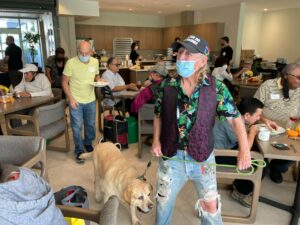 This November, the Center’s Anita May Rosenstein Campus will host its first intergenerational Thanksgiving celebration. LGBT youth and seniors will come together to celebrate the holiday by sharing a meal, embodying the vision set by Center leadership decades ago. But Pollock and the Center’s new CEO, Joe Hollendoner, are already looking toward a new horizon.
This November, the Center’s Anita May Rosenstein Campus will host its first intergenerational Thanksgiving celebration. LGBT youth and seniors will come together to celebrate the holiday by sharing a meal, embodying the vision set by Center leadership decades ago. But Pollock and the Center’s new CEO, Joe Hollendoner, are already looking toward a new horizon.
Hollendoner said he hopes to expand housing for LGBT seniors even more in the coming years, calling it “the single greatest issue facing our elders.”
“It’s a huge need,” Pollock agreed. “Particularly for older adults who are being priced out of housing. Rents are skyrocketing, but most of the time, our older adults are the most vulnerable to being pushed out of their housing because they’re on fixed income; they often can’t incur a 10 or 15% rent increase.”
But the work of helping LGBT seniors “age in place” hardly ends at housing. Pollock and Hollendoner want to do more.
“Older LGBT adults are more likely to live alone and have less family support,” Pollock said. “So as they’re aging, they often don’t have someone to take care of them, and that places them in a situation where they’re more vulnerable. I think there’s a lot we could do to help folks with caregiving services and medical care coordination throughout the process.”
Hollendoner called for more “culturally-competent and affirming assisted living and home care services for LGBT seniors,” noting that current offerings often force seniors back into the closet.”
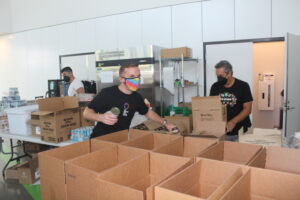 “The generation of LGBTQ+ individuals who came before me were the pioneers of our movement, and it is our moral obligation to ensure that these trailblazers have the care they not only need but deserve,” Hollendoner said. “I am incredibly proud of the Center’s work over the last 25 years to provide health and social programming for LGBTQ+ seniors, and I’m deeply committed to expanding our services to better address the increasing, unmet needs of elders within our community.”
“The generation of LGBTQ+ individuals who came before me were the pioneers of our movement, and it is our moral obligation to ensure that these trailblazers have the care they not only need but deserve,” Hollendoner said. “I am incredibly proud of the Center’s work over the last 25 years to provide health and social programming for LGBTQ+ seniors, and I’m deeply committed to expanding our services to better address the increasing, unmet needs of elders within our community.”


